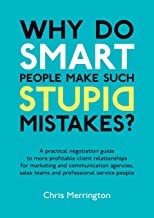Why Do Smart People Make Such Stupid Mistakes?


This is the title of a book I’ve just read, by Chris Merrington, the cover of which says that it’s a ‘practical negotiation guide to more profitable client relationships …’. He’s written it mainly for marketing agencies which is why I bought it, and yet many of his sales and negotiation techniques can be applied to other service businesses, including coaches, consultants and trainers. Merrington starts by saying that it’s not what you know – it’s what you do with what you know. Wise words! He also writes that pricing is a mix of voodoo and bingo – more wise words. This is, he claims, because people tend to buy emotionally and justify rationally – something I’ve written about before, including in an article that’s just been published here online.
Merrington says that price is what someone is prepared to pay for your service and that when someone is recommended to work with you, they will be more accepting of your price. If they see you as the same as your competitors, you will find it difficult to justify your premium price (because you do charge more than your competitors, don’t you?!) He writes that the longer you take to say your price, when talking to a prospect, the more money you will make. I think this is because if someone only wants to know how much you charge, they are just comparing you on price to your competitors. If you can have a conversation with a prospect about what they really need and how much value you can deliver, they will buy you before you’ve even mentioned the price. It’s also because once you’ve said your price, your potential client will stop listening and start thinking about other things. Stating your price at the start of the discussion means that your prospect doesn’t then hear what you tell them about value and how you can really help them.
How Do You Increase Your Prices?
If you really want to increase the prices that your existing clients pay, you need to show how you’re increasing the value that you provide. Start with your least profitable clients!
The good news is that it’s much easier to increase your prices when you take on a new client. The best time to do this is when you don’t really care if you win the new client or, or when you don’t really need a new client. If you’ve already hit your sales target for the month, then you’ll be quite relaxed going into the negotiation, rather than seeming a bit desperate. When you’re more relaxed and not chasing a new client, they will feel more relaxed about working with you – they might even feel that they have to work harder to become one of your clients.
Here’s the really clever bit. Whether you have hit your sales target or not, think and act as if you have already hit it! Give your prospect the impression that you don’t really need their business and you’re certainly not desperate for it and they are more likely to want to work with you.
Aim your fees slightly above what you’re comfortable charging – stretch your comfort zone, because it’s easier to come down in price if your prospect says you’re too expensive. It’s much harder to put your prices up if you offered a low introductory fee. And then sell your expertise. Charge what you’re worth, not what you think clients will pay. Develop your expertise to be either unique or scarce and people will pay a premium to work with you.
Never apologise for your price. Say it with pride and confidence. If you lack confidence in your price, it is unlikely that your potential client will feel confident in you price and the value you can deliver. “I’m sorry but it costs this …” won’t really inspire your prospect to trust you and work with you.
According to Chris Merrington, the happiest clients are the ones who pay your full price. Why? Because their perception of you decreases as soon as you drop your price or offer a discount. Higher prices suggest better quality and more benefits. Think Aldi versus Waitrose versus Fortum and Mason and use language that sells the value and results that you can deliver.
“You’re very expensive”
How can you respond when potential clients say this? Merrington has these suggestions:
“There’s a good reason our price is high. Our clients get great results.”
“Putting price aside, is this what you want?”
“On what basis is it too expensive?”
Rather than just offering to drop your prices, or walking away, it’s worth first having a conversation with your prospect about what they really think about your pricing. It might be that in the end you do need to walk away (because you’re not going to drop your prices, are you!?) because some people just don’t see the true value, or really don’t need what you’re offering right now. Walking away and holding your pricing can be very empowering and will earn you more respect than a desperate discount. But do have that conversation first; a bit of negotiation might win you a new client. Above all, charge what you are worth and not what you think a client will pay.
If you need more advice on sales and negotiation, I do recommend that you read the whole of Chris Merrington’s book. It’s an easy read and contains far more tips than I can fit into one blog.
Putting it into Practice
Now I’m going to put not caring into practice and see what happens. There is a place available on the August Clients4Coaches course that I’m running and I really don’t mind if I fill the course or not. The people who have booked are great coaches and I know that they will have a wonderful experience. The details are at www.Appletreeuk.com/Clients-4-Coaches if you would like more information or if you know anyone else who might be interested. And if you don’t, that’s fine too!




